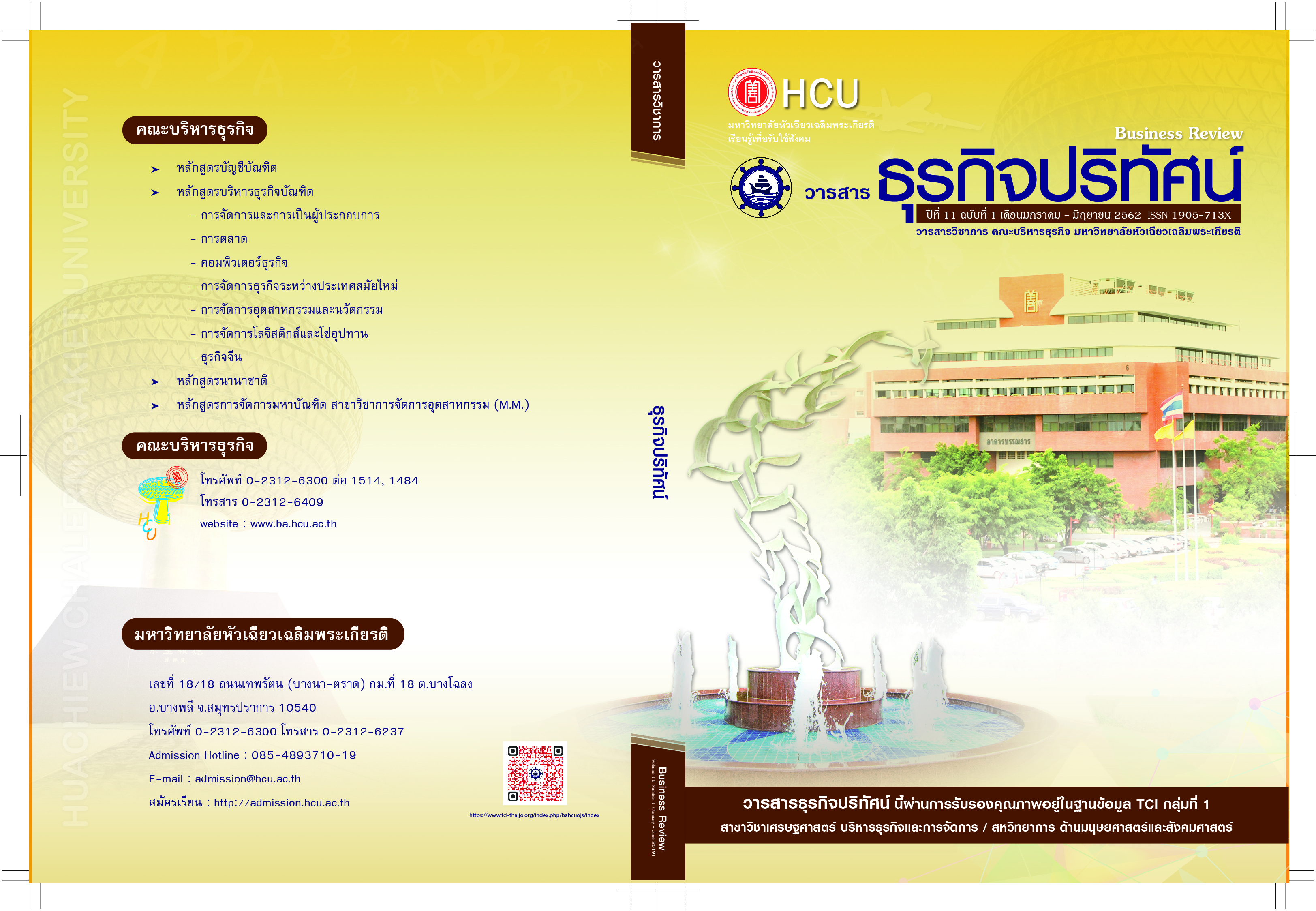Inflf luence of Firms’ Characteristics on Firms’ Value Through Corporate Social Responsibility Report of the Listed Companies in the Stock Exchange of Thailand
Keywords:
Firms’ Characteristics, Corporate Social Responsibility, Firms’ ValueAbstract
The aim of this research is to investigate the influence of firms’ characteristics on
firms’ value through corporate social responsibility report. Populations are a number of 570
listed companies in the Stock Exchange of Thailand (SET) in 2014. This research utilized data
of 363 listed companies in SET by Stratified Random Sampling and analyzed data by using
structural equation model (SEM) and Multiple Indicators and Multiple Causes (MIMIC). The
results of research reveal the characteristics of firms do have an impact on firms’ value through
corporate social responsibility report at statistical significance of 0.05 and coefficient value of
0.20*. In sum, the test of hypothetical model is in harmony with empirical result at statistical
values as follows: χ2/2 = 1.02, CFI = 0.98, GFI = 0.96, AGFI = 0.91, RMSEA = 0.01 and
SRMR = 0.04
References
กรุงเทพฯ:ตลาดหลักหลักทรัพย์แห่งประเทศไทย.
ตลาดหลักหลักทรัพย์แห่งประเทศไทย. (2557). รายชื่อบริษัทจดทะเบียนในตลาดหลักทรัพย์. สืบค้นเมื่อ
31 ธันวาคม 2557, จาก รายชื่อบริษัทจดทะเบียนในตลาดหลักทรัพย์แห่งประเทศไทย ตลาดหลัก
หลักทรัพย์แห่ง ประเทศไทย เว็บไซต์ :http://www.set.or.th/th/company/companylist.html
พวงชมพู โจนส์. (2557). กิจการเพื่อสังคม: ความรับผิดชอบต่อสังคมเพื่อการพัฒนาอย่างยั่งยืนของธุรกิจ
โรงแรมและภัตตาคาร. วารสารธุรกิจปริทัศน์, 6(2), 199–216.
อรรถพล ธรรมไพบูลย์, นุช สิทธาฉัตรมงคล และลาวรรณ์ อนันต์ชลาลัย. (2559). การรับรู้เกี่ยวกับการ
จัดการห่วงโซ่อุปทานสีเขียวและผลกระทบต่อภาพลักษณ์องค์กร. วารสารธุรกิจปริทัศน์, 8(2),
109–128.
อาณัติ ลีมัคเดช. (2556). การส่งสัญญาณด้วยรางวัลรับผิดชอบต่อสังคม: กรณีศึกษาของบริษัทจดทะเบียน
ในตลาดหลักทรัพย์แห่งประเทศไทย. วารสารบริหารธุรกิจ, 36(139), 27–42.
Adelopo, I. (2010). Voluntary Disclosure Practices among Listed Company in Nigeria. Advances in
Accounting. Incorporating Advances in International Accounting, 27(2011), 338–345.
Alsaeed, K. (2006). The Association between Firm – Specific Characteristics and Disclosure:
The Case of Saudi Arabia. Managerial Auditing Journal, 21(5), 476–496.
Anderson, J. C. & Frankle, A. W. (1980).Voluntary Social Reporting: An Iso-beta Portfolio Analysis.
Accounting Review, 55(1), 467 – 479.
Antal, A. B., Dierkes, A., Meinolf, D., Keith, M. M., & Lutz, M. (2002): Corporate Social Reporting
Revisited. Berlin Social Science, 2(2), 1-41.
Barmea, A. & Rubin, A. (2010). Corporate Social Responsibility as A Conflict between Shareholders.
Journal of Business Ethics, 97(1), 71–86.
Bevan, S., Lsles, N., Emery, P. & Hoskins, T. (2004). Achieving High Performance: CSR at the
Heart of Business. London: The Work Foundation. 1(1), 775-787.
Brecchetti, L., Ciciretti, R., Hasan, I. & Kobeissi, N. (2012). Corporate Social Responsibility
and Shareholder’s Value. Journal of Business Research, 65(11), 1628-1635.
Brennan, M. J. & Copeland, T. E. (1988). Stock Splits, Stock Prices, and Transaction Costs.
Journal of Financial Economics, 22(1), 83-101.
Bowman, E. H. (1978). Strategy, Annual Reports, and Alchemy. California Management Review,
20(2), 64 – 71.
Cheng, W. L. & Ahmad J. (2010). Incorporating Stakeholders Approach in Corporate Social
Responsibility (CSR): A Case Study at Multinational Corporations (MNCs) in Penang.
Social Responsibility journal, 6(4), 593–610.
Chih-Wei Peng & Mei-Ling Yang (2014). The Effect of Corporate Social Performance on Financial
Performance: The Moderating Effect of Ownership Concentration. Journal of Business
Ethics, 123(1), 171–182.
Cormier, D., Gordon, I. M. & Magnan, M. (2004). Corporate Environmental Disclosure: Contrasting
Management's Perceptions with Reality. Journal of Business Ethics, 49(2), 143-165.
Dhaliwal, D. O., Li, A. T. & Yang, Y. (2011). Voluntary Nonfinancial Disclosure and the Cost of
Equity Capital: The Initiation of Corporate Social Responsibility Reporting. The Accounting
Review, 86 (1), 59 – 100.
Hossain, M., Perera, H. B. & Rahman, A. R. (1998). Voluntary Disclosure in the Annual Reports
of New Zealand Companies. Journal of International Financial Management and Accounting,
69(1), 69–85.
Leland, H. E. & Pyle, D. H. (1977). Informational Asymmetries, Financial Structure, and Financial
Intermediation. Journal of Finance, 32(2), 371-387.
Maheshwarl, G. C. (2007). Corporate Characteristics & Social Responsibility Reporting. Asian Review
of Accounting, 1(1), 31-42.
Nazli, A. (2007). Ownership Structure and Corporate Social Responsibility Disclosure: Some
Malaysian Evident. Corporate Governance Journal, 7(3), 251–256.
Otgontsetseg, E., Qian, L. & Anand, V. (2013). Corporate Social Responsibility and Its Impact on
Firms Investment Policy, Organizational Structure and Performance. Journal of Business
Ethics, 118(2), 395-412.
Porter, M. E. & Kramer, M. R. (2006). The Ling between Competitive Advantage and Corporate
Social Responsibility. Harvard Business Review, 84(12), 78–79.
Reverte, C. (2009). Determinants of Corporate Social Responsibility Disclosure Ratings by Spanish
listed Firm. Journal of business Ethics, 88(2), 595-612.
Roberts, R. (1992). Determinants of Corporate Social Responsibility Disclosure. Accounting
Organization and Society,17(6), 595 - 612.
Ross, S. A. (1977). The Determination of Financial Structure: The Incentive Signaling Approach.
The Bell Journal of Economics, 8(1), 23-39.
Schaltegger, S. & Burritt, R. (2005). Corporate Sustainability. In H. Folmer and T. Tietenberg, (Eds.),
The International Yearbook of Environmental and Resource Economics. Cheltenham, UK:
Edward Elgar.
Singhvi, S. S. & Desai, H. B. (1971). An Empirical Analysis of the Quality of Corporate Financial
Disclosure. Accounting Review, 46(3), 129 – 138.
Stephenson, A. (2009). The Pursuit of CSR and Business Ethics Policies: Is it a Source of
Competitive Advantage for Organizations. The Journal of American Academy of Business,
14(2), 251-262.
Tagesson, T. B. O. (2009). What Explains the Extent and Content of Social and Environment on
Corporate: A Study of Social and Environmental Reporting in Swedish Listed Corporates.
Corporate Social Responsibility & Environmental, 16(6), 352 - 364.
Watts, R. L. & Zimmerman, J. L. (1978). Towards a Positive Theory of the Determination of
Accounting Standards. The Accounting Review, 53(1), 112 – 143.
Weber, M. (2008). The Business Case for Corporate Social Responsibility: A Company – Level
Measurement Approach for CSR. European Management Journal, 26(4), 247–261.
Downloads
Published
How to Cite
Issue
Section
License
All articles published in the Business Administration and Management Journal Review are copyrighted by the journal.
The views and opinions expressed in each article are solely those of the individual authors and do not represent those of Huachiew Chalermprakiet University or any other faculty members. Each author is fully responsible for the content of their own article. Any errors or issues found are the sole responsibility of the respective author.




